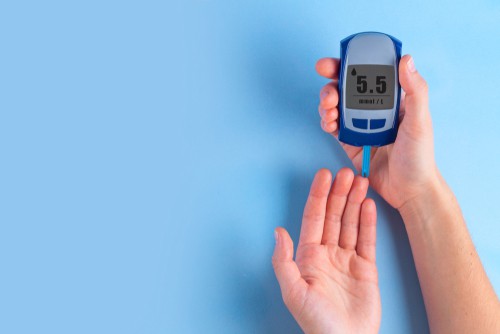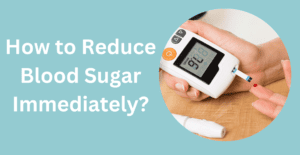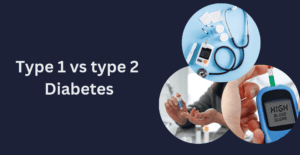Hypoglycemia, also known as low blood sugar, is a condition in which blood glucose levels fall below normal. Glucose is an important source of energy for the body, and when levels drop too low, it can cause a range of hypoglycemia symptoms and potentially dangerous consequences. Hypoglycemia can occur in individuals with and without diabetes and is often a side effect of medications used to treat diabetes, such as insulin. Understanding the causes, symptoms, Diabetes Treatment, and prevention of hypoglycemia is important for anyone who may be at risk for the condition.
What is Hypoglycemia? – High Blood Sugar
Hypoglycemia and high blood sugar are two distinct conditions that can affect your health and well-being. It is important to understand the differences between these two conditions, their causes, hypoglycemia symptoms(low blood sugar symptoms), treatments, and prevention.
Hypoglycemia: What is it?
Hypoglycemia, also known as low blood sugar, is a condition in which the level of glucose in your blood falls below normal levels. Glucose is an important source of energy for the body and when levels fall too low, it can cause a range of hypoglycemia symptoms(low blood sugar symptoms), such as headache, confusion, weakness, sweating, and in severe cases, unconsciousness. Hypoglycemia can be caused by various factors, including the use of certain medications, such as insulin, alcohol consumption, and skipping meals.
High Blood Sugar: What is it?
High blood sugar, also known as hyperglycemia, is a condition in which the level of glucose in your blood is higher than normal. This is a common characteristic of conditions such as diabetes, in which the body is unable to properly regulate what is normal blood sugar level. High blood sugar can cause a range of Symptoms of Diabetes, hypoglycemia symptoms(low blood sugar symptoms), including increased thirst, frequent urination, fatigue, blurred vision, and slow healing of cuts and wounds.
What causes hypoglycemia? What causes hypoglycemia in people with diabetes?
Hypoglycemia can be caused by several factors, including:
- Medications: Certain medications, such as insulin, can cause low blood sugar levels in individuals with diabetes. Overdose of insulin or other medications that lower blood sugar levels can also cause hypoglycemia.
- Skipping meals: Skipping meals, particularly in individuals with diabetes who take insulin or other blood sugar-lowering medications, can cause low blood sugar levels.
- Alcohol consumption: Drinking excessive amounts of alcohol can cause hypoglycemia, particularly in individuals with diabetes who take insulin or other blood sugar-lowering medications.
- Intense physical activity: Physical activity can lower blood sugar levels, especially if it is done on an empty stomach or in individuals with diabetes who take insulin or other blood sugar-lowering medications.
- Certain medical conditions: Certain medical conditions, such as liver disease, can also cause low blood sugar levels.
Other possible causes
Other possible causes of hypoglycemia include:
- Hormonal disorders: Hormonal disorders, such as adrenal insufficiency (Addison’s disease) or hypothyroidism, can cause low blood sugar levels.
- Certain cancers: Certain cancers, such as insulinomas, which are rare tumors of the pancreas, can secrete insulin and cause low blood sugar levels.
- Reactive hypoglycemia: Reactive hypoglycemia is a condition in which low blood sugar levels occur after eating a meal. This can be caused by the overproduction of insulin in response to a meal, which causes blood sugar levels to drop too low.
- Surgery: Some surgical procedures, such as gastric bypass surgery, can cause low blood sugar levels by affecting the way the body processes glucose.
- Infections: Serious infections, such as sepsis, can cause low blood sugar levels by affecting the body’s ability to process glucose.
- Other medical conditions: Other medical conditions, such as congenital hyperinsulinism (a rare genetic disorder) and some inherited enzyme deficiencies, can also cause low blood sugar levels.
What are the symptoms of hypoglycemia?
Early Signs And Symptoms
The early signs and hypoglycemia symptoms can include:
- Hunger
- Shakiness
- Sweating
- Dizziness or lightheadedness
- Rapid heartbeat
- Nervousness or anxiety
- Blurred vision
- Fatigue or weakness
These hypoglycemia symptoms(low blood sugar symptoms) can develop quickly, sometimes within a few minutes of a drop in blood sugar levels. It is important to recognize these early signs and symptoms and take steps to raise your blood sugar levels as soon as possible. This can help prevent more serious symptoms and complications from developing. If you have diabetes or another condition that puts you at risk for hypoglycemia, it is important to monitor your blood sugar levels regularly and carry glucose or another source of sugar with you in case of an emergency.
Later Signs And Symptoms
The later signs and hypoglycemia symptoms(low blood sugar symptoms) can include:
- Confusion or irritability
- Headaches
- Numbness or tingling in the mouth or lips
- Slurred speech
- Seizures
- Unconsciousness
- Coma
These symptoms can occur if hypoglycemia is not treated promptly and effectively. In severe cases, hypoglycemia can cause serious and potentially life-threatening complications, such as seizures, unconsciousness, or coma. If you experience any of these symptoms, seek medical attention immediately. It is important to work closely with a healthcare provider for Diabetes Management of your condition and prevent hypoglycemia from occurring or becoming more severe.
Types of Hypoglycemia (Mild, Moderate, and Severe)
Hypoglycemia can be classified into three different categories based on the severity of symptoms:
- Mild hypoglycemia: Mild hypoglycemia is characterized by early symptoms such as hunger, shakiness, sweating, dizziness, or lightheadedness. These symptoms can be easily managed with a small amount of glucose or another source of sugar, such as fruit juice or candy.
- Moderate hypoglycemia: Moderate hypoglycemia is characterized by low blood sugar symptoms such as confusion, irritability, headache, or numbness or tingling in the mouth or lips. These symptoms may be more difficult to manage and may require a larger dose of glucose or another source of sugar.
- Severe hypoglycemia: Severe hypoglycemia is characterized by symptoms such as seizures, unconsciousness, or coma. This is a medical emergency that requires prompt medical attention and intervention to prevent serious and potentially life-threatening complications.
It is important to recognize the symptoms of hypoglycemia and take appropriate measures to manage the condition, regardless of the severity of the low sugar symptoms. Regular monitoring of blood sugar levels, proper management of diabetes or other conditions that put you at risk for hypoglycemia, and prompt treatment of low sugar symptoms can help prevent hypoglycemia from becoming more severe or recurring.
Reactive Hypoglycemia
Reactive hypoglycemia is a condition in which blood sugar levels drop too low, usually within a few hours after eating. It occurs in people who do not have diabetes, and it is often caused by an overproduction of insulin in response to a meal, which leads to a rapid and excessive drop in blood sugar levels.
Symptoms of reactive hypoglycemia can be similar to those of hypoglycemia in people with diabetes and can include shakiness, sweating, dizziness, lightheadedness, headache, confusion, irritability, and fatigue. These low sugar symptoms can be managed by eating a small snack that contains carbohydrates, such as fruit, crackers, or a glass of juice, to help raise blood sugar levels.
In some cases, reactive hypoglycemia can be related to an underlying medical condition, such as a gastric bypass or other gastrointestinal surgery, or a hormonal imbalance. If you have symptoms of reactive hypoglycemia, it is important to see a healthcare provider for a proper diagnosis and to develop an appropriate management plan. Treatment may involve changes to your diet, exercise regimen, or medications, as well as regular monitoring of blood sugar levels.
Fasting Hypoglycemia
Fasting hypoglycemia is a condition in which blood sugar levels drop too low after a period of fasting, such as overnight or during a planned fast. It can occur in people who do not have diabetes, and it is often related to an underlying medical condition that affects the way the body processes glucose.
Symptoms of fasting hypoglycemia can include shakiness, sweating, dizziness, lightheadedness, headache, confusion, irritability, and fatigue. These low sugar symptoms can be managed by eating a small snack that contains carbohydrates, such as fruit, crackers, or a glass of juice, to help raise blood sugar levels.
Fasting hypoglycemia can be a cause of hypoglycemia by several underlying medical conditions, including liver disease, pancreatic disease, hypothyroidism, and some medications. If you have symptoms of fasting hypoglycemia, it is important to see a healthcare provider for a proper diagnosis and to develop an appropriate management plan. Treatment may involve changes to your diet, exercise regimen, or medications, as well as regular monitoring of blood sugar levels. In some cases, fasting hypoglycemia can be managed with a special diet, such as a low-glycemic diet, or with medication. Learn more about Type 1 Diabetes Vs Type 2 Diabetes to get a better understanding.
Diagnosis of Hypoglycemia
Diagnosing hypoglycemia can involve a combination of medical history, physical examination, and laboratory tests. The goal of the diagnosis is to determine the underlying cause of hypoglycemia or low blood sugar and to determine the best course of treatment.
The first step in diagnosing hypoglycemia is to take a medical history and perform a physical examination. Your healthcare provider will ask about your hypoglycemia symptoms(low blood sugar symptoms), including when they occur, and how often they occur. Your provider will also ask about any medications you are taking, as some medications can cause hypoglycemia.
The next step in diagnosing hypoglycemia is to perform laboratory tests to measure blood sugar levels. These tests can include a fasting blood sugar test, which measures blood sugar levels after an overnight fast, and a glucose tolerance test, which measures blood sugar levels after drinking a glucose solution.
In some cases, additional diabetes test at home may be necessary to diagnose the underlying cause of hypoglycemia, such as a CT scan, MRI, or hormonal tests. Your healthcare provider will work with you to determine the best course of diagnostic testing based on your specific hypoglycemia symptoms(low blood sugar symptoms) and medical history.
It is important to seek medical attention if you have symptoms of hypoglycemia, as prompt diagnosis and treatment can help prevent serious complications and improve overall health.
How do I treat Hypoglycemia?
Treatment for hypoglycemia depends on the underlying cause of hypoglycemia and the severity of the condition. Some common treatments for hypoglycemia include:
- Lifestyle changes: Making changes to your diet, exercise regimen, and overall lifestyle can help manage hypoglycemia. This can include eating small, frequent meals and snacks, limiting alcohol consumption, and engaging in regular physical activity.
- Medications: If hypoglycemia is caused by an underlying medical condition or medication, adjusting your medication or switching to a different medication may be necessary. Your healthcare provider can help determine the best course of action.
- Glucose supplementation: Consuming glucose-rich foods or drinks, such as fruit juice or a glucose gel, can help raise blood sugar levels quickly and effectively.
- Monitoring blood sugar levels: Regular monitoring of what is normal blood sugar level can help you and your healthcare provider identify patterns and triggers for hypoglycemia, and adjust Hypoglycemia treatment accordingly.
Learn more about What is Hyperglycemia for better understanding.
How can I treat and manage Hypoglycemia?
Treating and managing hypoglycemia can involve a combination of lifestyle changes and medical management. Here are some steps you can take to help treat and manage hypoglycemia:
- Monitor your blood sugar levels regularly: Keeping track of your what is normal blood sugar level can help you identify patterns and triggers for hypoglycemia, and make adjustments to your Hypoglycemia treatment plan as needed.
- Follow a balanced diet: Eating regular, balanced meals and snacks can help maintain a stable what is normal blood sugar level and prevent hypoglycemia. This can include incorporating complex carbohydrates, healthy fats, and protein into your meals and snacks.
- Avoid fasting or skipping meals: Skipping meals or going for long periods without eating can cause blood sugar levels to drop and trigger hypoglycemia. It’s important to eat regular, balanced meals and snacks to maintain stable blood sugar levels.
- Limit alcohol consumption: Alcohol can cause blood sugar levels to drop and increase the risk of hypoglycemia. Limiting alcohol consumption or avoiding it altogether can help prevent hypoglycemia.
- Engage in regular physical activity: Regular physical activity can help regulate blood sugar levels and prevent hypoglycemia. Aim for at least 30 minutes of moderate-intensity exercise, such as brisk walking, most days of the week.
- Carry glucose-rich snacks: If you experience hypoglycemia, having quick-acting glucose sources, such as fruit juice or glucose gel, on hand can help raise blood sugar levels quickly.
- Work with your healthcare provider: Regular follow-ups with your healthcare provider can help monitor your condition and make adjustments to your Hypoglycemia treatment plan as needed.
How do I prevent Hypoglycemia?
Preventing hypoglycemia involves making lifestyle changes, monitoring your blood sugar levels regularly, and working closely with your healthcare provider. Here are some steps you can take to prevent hypoglycemia:
- Follow a balanced diet: Eating regular, balanced meals and snacks can help maintain stable blood sugar levels and prevent hypoglycemia. This can include incorporating complex carbohydrates, healthy fats, and protein into your meals and snacks.
- Avoid fasting or skipping meals: Skipping meals or going for long periods without eating can cause blood sugar levels to drop and trigger hypoglycemia. It’s important to eat regular, balanced meals and snacks to maintain stable blood sugar levels.
- Limit alcohol consumption: Alcohol can cause blood sugar levels to drop and increase the risk of hypoglycemia. Limiting alcohol consumption or avoiding it altogether can help prevent hypoglycemia.
- Engage in regular physical activity: Regular physical activity can help regulate blood sugar levels and prevent hypoglycemia. Aim for at least 30 minutes of moderate-intensity exercise, such as brisk walking, most days of the week.
- Monitor your blood sugar levels regularly: Keeping track of your blood sugar levels can help you identify patterns and triggers for hypoglycemia, and make adjustments to your Hypoglycemia treatment plan as needed.
- Work with your healthcare provider: Regular follow-ups with your healthcare provider can help monitor your condition and make adjustments to your Hypoglycemia treatment plan as needed, including adjusting medication doses if necessary. Learn about science of diabetes.
Risk Factors/Complications of Hypoglycemia
Risk factors for hypoglycemia include:
- Having diabetes: People with diabetes, especially those who take insulin or oral medications that lower blood sugar levels are at higher risk of hypoglycemia.
- Skipping meals or fasting: Going for long periods without eating can cause blood sugar levels to drop and increase the risk of hypoglycemia.
- Alcohol consumption: Drinking alcohol can cause blood sugar levels to drop, especially when consumed on an empty stomach.
- Physical activity: Engaging in physical activity, especially intense or prolonged exercise, can cause blood sugar levels to drop and increase the risk of hypoglycemia.
- Certain medications: Some medications, such as insulin, sulfonylureas, and meglitinides, can lower blood sugar levels and increase the risk of hypoglycemia.
- Advanced age: As we age, our bodies may become less able to recognize and respond to low blood sugar levels, increasing the risk of hypoglycemia.
- Medical conditions: Certain medical conditions, such as liver or kidney disease, can affect how the body processes and regulates blood sugar levels, increasing the risk of hypoglycemia.
Complications of hypoglycemia can include:
- Confusion and disorientation: Low blood sugar levels can cause of hypoglycemia confusion and disorientation, making it difficult to recognize and treat hypoglycemia.
- Seizures and unconsciousness: Severe hypoglycemia can lead to seizures and unconsciousness, which can be life-threatening.
- Heart and blood vessel problems: Hypoglycemia can cause of hypoglycemia rapid heartbeat, palpitations, and other heart and blood vessel problems.
- Brain damage: Severe or recurrent episodes of hypoglycemia can damage the brain and lead to cognitive impairment, memory loss, and other cognitive problems.
- Death: In severe cases, hypoglycemia can be life-threatening and lead to death.
It’s important to recognize the signs and symptoms of hypoglycemia and to treat it promptly and effectively to prevent serious complications. Learn more about this in our Diabetes Blogs.
When To See A Doctor
It is recommended to see a doctor if you experience symptoms of hypoglycemia frequently or if the symptoms are severe and affecting your daily activities. Additionally, if you have been diagnosed with diabetes, it is important to regularly monitor your blood sugar levels and seek medical attention if they become too low. If you have sudden symptoms of hypoglycemia, such as confusion or loss of consciousness, seek emergency medical help immediately.
Summary/Conclusion
Hypoglycemia meaning(hypoglycemia definition) is a condition characterized by low blood sugar levels. Common causes include excessive insulin intake, missed or delayed meals, excessive physical activity, and certain medications. Symptoms of hypoglycemia include sweating, shakiness, headache, confusion, and loss of consciousness. To prevent Hypoglycemia meaning(hypoglycemia definition), it is important to maintain a balanced diet, regularly monitor blood sugar levels, and communicate with your doctor about changes in medication or physical activity. If you experience frequent or severe symptoms, or if you have been diagnosed with diabetes, see a doctor. In case of sudden low sugar symptoms, seek emergency medical help immediately.
FAQs
What Hypoglycemia means?
Hypoglycemia meaning(hypoglycemia definition) is a medical condition characterized by low levels of glucose (sugar) in the blood. Glucose is the main source of energy for the body, and low levels of it can lead to low sugar symptoms such as sweating, shakiness, confusion, and in severe cases, loss of consciousness. Hypoglycemia can be a cause of hypoglycemia by factors such as excessive insulin intake, missed or delayed meals, excessive physical activity, and certain medications. It is most commonly seen in people with diabetes who are taking insulin, but it can also occur in people without diabetes under certain circumstances. Hypoglycemia treatment involves quickly raising blood sugar levels with food or drinks that contain sugar.
What are the three major symptoms of hypoglycemia?
The three major symptoms of hypoglycemia are:
- Shakiness or tremors: A person may feel shaky or have tremors in their hands, arms, legs, or whole body when their blood sugar levels drop.
- Sweating: Hypoglycemia can cause excessive sweating, especially on the forehead or temples.
- Confusion or irritability: Low blood sugar levels can also cause confusion, irritability, or other changes in mood and behavior.
In severe cases, Hypoglycemia meaning can cause loss of consciousness, seizures, and other serious complications. It is important to seek medical attention if you experience frequent or severe symptoms.
Which organ is most affected by hypoglycemia?
The brain is the organ most affected by Hypoglycemia meaning(hypoglycemia definition). The brain relies on a constant supply of glucose (sugar) to function properly, and low levels of glucose in the blood can lead to symptoms such as confusion, irritability, and loss of consciousness. If Hypoglycemia meaning is not treated promptly, it can cause of hypoglycemia brain damage and other serious complications. This is why it is important to seek medical attention if you experience symptoms of hypoglycemia. Become our next Diabetes Success Story!
What happens during hypoglycemia?
Hypoglycemia occurs when the level of glucose (sugar) in the blood drops below normal. Glucose is the primary source of energy for the body and the brain, and low levels of it can lead to symptoms such as shakiness, sweating, confusion, and irritability.
During hypoglycemia, the body releases hormones such as adrenaline and cortisol to increase the production of glucose in the liver and raise blood sugar levels. This response can cause symptoms such as rapid heartbeat and sweating. If hypoglycemia is not treated promptly, the body’s response can become less effective, leading to more severe symptoms such as loss of consciousness and seizures.
It is important to understand the underlying causes of hypoglycemia and take steps to prevent it, such as maintaining a balanced diet, Diabetes Recipes and regularly monitoring blood sugar levels, and communicating with your doctor about changes in medication or physical activity.
What is dangerously low blood sugar?
Dangerously low blood sugar refers to a medical emergency that occurs when the level of glucose (sugar) in the blood drops to a level that is too low to sustain normal bodily functions. This level is usually considered to be below 70 mg/dL, but it may vary depending on individual factors such as age, health status, and medications.
Dangerously low blood sugar can cause serious symptoms such as confusion, irritability, loss of consciousness, and seizures. In severe cases, it can lead to brain damage and other serious complications if not treated promptly. If you suspect that you or someone else may be experiencing dangerously low blood sugar, it is important to seek emergency medical attention immediately.
What causes low blood sugar without diabetes?
Low blood sugar (hypoglycemia) can occur in people without diabetes for a variety of reasons, including:
- Skipping meals or fasting: Fasting or skipping meals can be what causes low blood sugar levels because the body has no immediate source of glucose to use as energy.
- Excessive alcohol consumption: Alcohol interferes with the liver’s ability to release stored glucose into the bloodstream, what causes low blood sugar levels.
- Certain medications: Some medications, such as sulfonylureas (used to treat type 2 diabetes), can cause low blood sugar levels by increasing insulin production.
- Overactive adrenal or pituitary gland: Overproduction of hormones by the adrenal or pituitary glands can be what causes low blood sugar levels.
- Insulinoma: An insulinoma is a rare type of tumor that produces excess insulin, leading to low blood sugar levels.
- Liver disease: Some liver diseases, such as cirrhosis, can interfere with the liver’s ability to release stored glucose into the bloodstream.
What are the 3 Ps of hypoglycemia?
The “3 P’s” of hypoglycemia refer to three common symptoms that can occur as a result of low blood sugar levels:
- Pounding heart (Palpitations): A rapid heartbeat or a feeling of the heart “pounding” can occur as a result of the body’s release of adrenaline in response to low blood sugar levels.
- Perspiration: Excessive sweating can be a symptom of low blood sugar levels, especially on the forehead or temples.
- Pallor: Low blood sugar levels can cause pale skin, especially around the mouth and nails.
What is the range of Hypoglycemia?
Here is a table showing the commonly accepted range for hypoglycemia:
| Blood Glucose Level (mg/dL) | Hypoglycemia? |
|---|---|
| Below 70 | Yes |
| 70-99 | No |
| Above 100 | No |
What are the recurrent hypoglycemia causes?
Recurrent hypoglycemia, or frequent low blood sugar episodes, can have a variety of causes, including:
- Excessive insulin therapy: Taking too much insulin (especially in those with type 1 diabetes) can be what causes low blood sugar levels.
- Surgical procedures: Certain surgical procedures, such as gastric bypass surgery, can affect the body’s ability to regulate blood sugar levels and cause recurrent hypoglycemia.
- Insulinoma: An insulinoma is a rare type of tumor that produces excess insulin, leading to low blood sugar levels.
- Endocrine disorders: Certain endocrine disorders, such as hypopituitarism or adrenal insufficiency, can cause recurrent hypoglycemia by affecting the body’s ability to produce or regulate hormones that regulate blood sugar levels.
- Alcohol consumption: Consuming large amounts of alcohol can be what causes low blood sugar levels by interfering with the liver’s ability to release stored glucose into the bloodstream.
- Medications: Some medications, such as sulfonylureas (used to treat type 2 diabetes), can cause low blood sugar levels by increasing insulin production.









